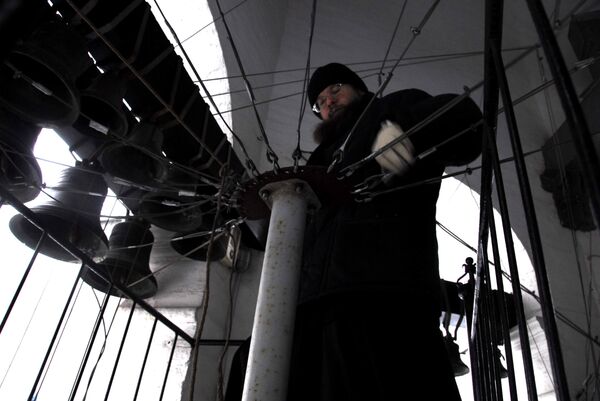Two young nuns climb the stone stairs of the belfry at Moscow's St. John the Baptist Convent to ring the bells for the evening service.
They are dwarfed by the bells, and it hardly seems possible that they can ring them. But they are undeterred.
"The sound of the bells is special," Mother Safroniya says, rubbing her hands together to warm them against the freezing air. "It is not music, but something more spiritual. This is a spiritual sound. This is how things are arranged by God."
Bells are fundamental to the Russian Orthodox Church, and in the Soviet-era they were persecuted just as the Church was. In the process of disbanding all the religious organizations in the Soviet Union, the Bolsheviks also dismantled bells in churches across Russia.
Many would never ring again, but the bells of the St. Daniel Monastery were spared. Father Roman tells how they were taken across the Atlantic to safety.
"Our bells were also dismantled, that happened in 1930, when the monastery was fully disbanded and closed as a religious organization," Father Roman says. "Fortunately, the bells were saved, although most likely they would have been destroyed."
U.S. businessman Charles Crane, a connoisseur of Russian culture, bought the bells from Russia and donated them to Harvard University, where the bells remained up until 2008 when - after extensive negotiations - they were returned to the monastery.
After the fall of the Soviet Union, the ban on religion was lifted. Church buildings and bells were restored and returned to the Church.
A Harvard delegation visited the St. Daniel Monastery for the handover ceremony, and was impressed by how important the bells were for the monastery.
"I remember the impression the people from Harvard had - that in Russia bells are treated like people," Father Roman said.
The bells, just as people, can also be punished.
"Their tongues might have been torn off or the bells themselves might have been exiled. Bells were even shot," he said.
In 1592, the Uglich Bell was exiled to Siberia after its sound informed about the death of Tsarevich (Prince) Dmitry, a possible heir to Boris Godunov.
In the past it was believed that the ringing of bells could drive away the plague, and indeed, the tolling was probably quite effective in scaring off rats.
"The sound of bells sanctifies the air for kilometers around. When Russia was hit by a plague, bells were rung. And people began recovering. Even the air is cleansed," Safroniya says.
In the Russian Orthodox Church, bell towers are considered a second altar. Safroniya says that not everyone is given permission to come up a bell tower. This is a deeply spiritual experience.
In the sub-zero temperatures, the nuns begin ringing the 800 kg bell with evident care and pride. The wind rushes through the stone tower. The sound is breathtaking.
MOSCOW, March 5 (RIA Novosti, Ekaterina Chernyaeva)

